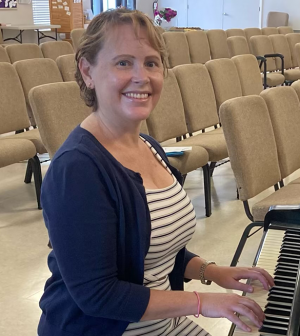- Could Your Grocery Store Meat Be Causing Recurring UTIs?
- Are You Making This Expensive Thermostat Error This Winter?
- Recognizing the Signs of Hypothyroidism
- 10 Strategies to Overcome Insomnia
- Could Artificial Sweeteners Be Aging the Brain Faster?
- Techniques for Soothing Your Nervous System
- Does the Water in Your House Smell Funny? Here’s Why
- Can a Daily Dose of Apple Cider Vinegar Actually Aid Weight Loss?
- 6 Health Beverages That Can Actually Spike Your Blood Sugar
- Treatment Options for Social Anxiety Disorder
Could Music Lessons Help Clear the ‘Brain Fog’ of Chemotherapy?

In a small, preliminary study, piano lessons provided to cancer patients undergoing chemotherapy appeared to help them maintain brain health.
“There were a lot of outside stressors contributing to my mood, but piano practice and going to lessons were always something good and positive that I would look forward to, no matter what else was happening,” said Robin Hesselink, an enrollee in a pilot program at the Moffitt Cancer Center in Tampa, Fla.
Heeselink, who’s undergoing treatment for stage 4 metastatic breast cancer, explained that “even for those 30 minutes or an hour, I could forget about the other stuff and have something enjoyable. At least temporarily, while I’m doing it, it has a very positive effect on me.”
Besides those mood-boosting effects, the piano lessons appeared to enhance the “executive function” of participants’ brains, according to a news release from the University of South Florida (USF).
The new protocol, called Keys to Staying Sharp, seeks to curb declines in memory and thinking that sometimes accompany chemotherapy, explained Jennifer Bugos, a professor of music education at USF.
“We are interested in examining whether social support while learning a musical instrument can increase cognition in patients undergoing treatment for cancer,” she said in a university news release.
Specifically, the research is looking at “which areas of cognition may be improved and what duration of music training is optimal for patients,” Bugos said.
“Receiving a cancer diagnosis and undergoing cancer treatment can significantly impact mental health and overall patient wellness,” added Moffitt surgical oncologist Dr. Melissa Mallory, who’s working with Bugos on the project. “Identifying new strategies to improve outcomes in these arenas — especially medication-free options — is needed to facilitate truly comprehensive patient-centric cancer care.”
The new data has yet to be published in a peer-reviewed journal, and the piano lessons involved just 15 patients. However, the preliminary feedback from patients has been positive, the researchers said.
According to Bugos, music therapy might also help folks recovering from severe COVID.
Playing an instrument called a J-Sax, a smaller form of saxophone, appeared to helped COVID survivors breathe easier and boost their cognitive skills, based on standard tests, Bugos noted.
“It was a privilege to participate in the JSax program and I had a lot of fun being part of it,” study participant Darlene DeMarie said in the USF news release. “It definitely was challenging at first, but it was rewarding when I noted my progress over time. Music is like therapy, and it definitely adds to our lives.”
More information
Find out more about the mental side effects of breast cancer chemotherapy at the Mayo Clinic.
SOURCE: University of South Florida, news release, Oct. 4, 2024
Source: HealthDay
Copyright © 2026 HealthDay. All rights reserved.










